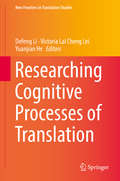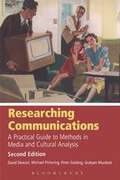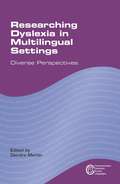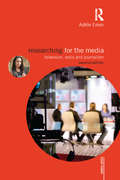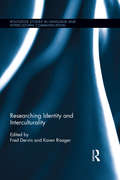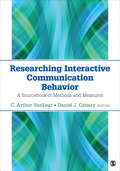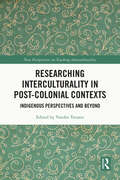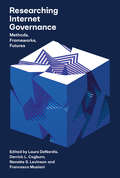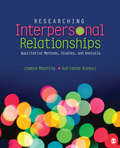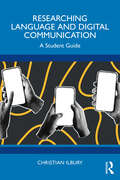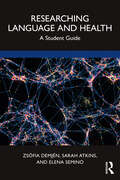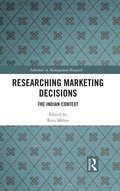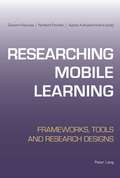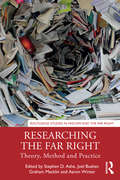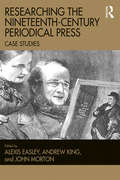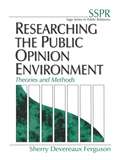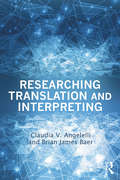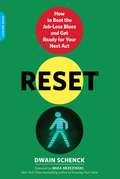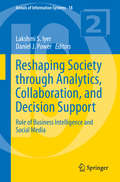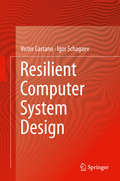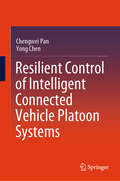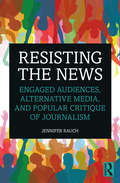- Table View
- List View
Researching Cognitive Processes of Translation (New Frontiers in Translation Studies)
by Defeng Li Victoria Lai Lei Yuanjian HeThis edited volume covers an array of the most relevant topics in translation cognition, taking different approaches and using different research tools. It explores theoretical and methodological issues using case studies and examining their practical and pedagogical implications. It is a valuable resource for translation studies scholars, graduate students and those interested in translation and translation training, enabling them to conceptualize translation cognition, in order to enhance their research methods and designs, manage innovations in their translation training or simply understand their own translation behaviours.
Researching Communications: A Practical Guide to Methods in Media and Cultural Analysis
by David Deacon Michael Pickering Peter Golding Graham MurdockThe new edition of the highly respected Researching Communications is a comprehensive and authoritative guide to researching media and communication. Introducing the major research methods, giving detailed examples of research analysis and practical step-by-step guidance in clear language, Researching Communications, Second Edition is an invaluable guide to performing and analyzing research tasks. Written by highly regarded experts in the field, the new edition includes expanded and updated sections on the Internet, online databases and the latest CAQDAS packages, as well as new case studies, international examples, and details of recent developments in media and communication studies. Undergraduate and postgraduate media- and communication-studies students will find Researching Communications an invaluable resource at all stages of their course.
Researching Dyslexia in Multilingual Settings
by Deirdre MartinThis volume draws together current research on dyslexia and literacy in multilingual settings across disciplines and methodologies. The contributors, all internationally recognised in the field, address developmental and acquired literacy difficulties and dyslexia in a range of language contexts including EAL/EFL. The book uses theories and analytical frameworks of a critical nature to reveal prejudicial social practices, and suggests future research directions towards a critical re-consideration of current understandings of dyslexia in multilingual settings, with a view to foregrounding the potential for interdisciplinarity. The book also suggests ways forward for evidence-informed practice, and it will be a valuable resource for researchers, practitioners and students alike.
Researching for the Media: Television, Radio and Journalism (Media Skills)
by Adele EmmResearching for the Media: Television, Radio and Journalism is an essential guide to researching for the media industry. It explains the role of the researcher and journalist within radio, television and journalism exploring key areas of what to expect in the job. Researching for the Media: Television, Radio and Journalism offers advice and instruction on practical, ethical and legal issues which affect anyone working in these industries. Beginning with suggestions on how to think up ideas and how to devise treatments, through to general research methods and techniques and guidance on working on location at home and abroad, it uses real examples of good and bad practice from the industry. Written by an experienced researcher, writer and producer, Researching for the Media includes: Tips on finding contributors from contestants, experts and specialists through to audiences and celebrities How to find photographs, picture and film clips and the ethical and legal issues involved Advice on finding and using music and copyright issues How the media uses the internet and social media such as Twitter, Facebook, Instagram A discussion of risk assessment, codes of conduct, ethical behaviour and legal and safety issues A glossary of media terms, further reading and a list of helpful websites. Discover more at www.adeleemm.com
Researching Identity and Interculturality (Routledge Studies in Language and Intercultural Communication #3)
by Fred Dervin Karen RisagerThis volume focuses on advances in research methodology in an interdisciplinary field framed by discourses of identity and interculturality. It includes a range of qualitative studies: studies of interaction, narrative studies, conversation analysis, ethnographic studies, postcolonial studies and critical discourse studies, and emphasizes the role of discourse and power in all studies of identity and interculturality. The volume particularly focuses on critical reflexivity in every stage of research, including reflections on theoretical concepts (such as ‘identity’ and ‘interculturality’) and their relationship with methodology and analytical practice, reflections on researcher identity and subjectivity, reflections on local and global contexts of research, and reflections on language choice and linguacultural aspects of data generation, analysis and communication.
Researching Interactive Communication Behavior: A Sourcebook of Methods and Measures
by Daniel J. Canary Dr C. Arthur VanLearResearching Interactive Communication Behavior by C. Arthur VanLear and Daniel J. Canary provides students and experienced researchers with tools for studying communication behaviors through direct observation. The sourcebook provides sound coverage of both cutting-edge and well-established systems, measurements, and procedures, as well as detailed information on measurement selection, coding, reliability assessment, and analysis. In addition to offering theoretical discussions, each chapter also focuses on how to apply systems and principles in conducting actual original research and uses examples and exemplars to help readers understand and apply the methods.
Researching Interactive Communication Behavior: A Sourcebook of Methods and Measures
by Daniel J. Canary Dr C. Arthur VanLearResearching Interactive Communication Behavior by C. Arthur VanLear and Daniel J. Canary provides students and experienced researchers with tools for studying communication behaviors through direct observation. The sourcebook provides sound coverage of both cutting-edge and well-established systems, measurements, and procedures, as well as detailed information on measurement selection, coding, reliability assessment, and analysis. In addition to offering theoretical discussions, each chapter also focuses on how to apply systems and principles in conducting actual original research and uses examples and exemplars to help readers understand and apply the methods.
Researching Interculturality in Post-Colonial Contexts: Indigenous Perspectives and Beyond (New Perspectives on Teaching Interculturality)
by Vander TavaresThis volume critically explores intercultural "encounters" between Indigenous and Eurocentric education in the post-colonial contexts of Brazil, Chile, and Mexico.In this book, interculturality in education is considered in a variety of educational and social settings, including teacher, community, secondary, and higher education, as well as language revitalization efforts, from a wide range of analytical and methodological perspectives. The contributors examine historical and emerging challenges in initiatives to expand or redesign education through interculturality/ies, highlighting the work that remains on the educational agenda while also identifying obstacles perpetuated by ideologies of monoculturalism, neoliberalism, and capitalism. Several case studies are presented to showcase pedagogical creativity, curricular innovation, and epistemological plurality in intercultural education and research. The volume also includes two expert transcultural commentaries that approach the challenges and opportunities in a comparative way, drawing on Indigenous perspectives beyond the three countries studied. This book argues for a critical and decolonial engagement with interculturality (in) education and research, emphasizing ethical collaboration, diverse worldviews, and resistance to epistemic singularity.This book will be essential for scholars and students of intercultural studies, education, and decolonization. It also provides valuable insights for educators navigating intercultural and Indigenous education.
Researching Internet Governance: Methods, Frameworks, Futures (Information Policy)
by Laura DeNardis, et al.Scholars from a range of disciplines discuss research methods, theories, and conceptual approaches in the study of internet governance.The design and governance of the internet has become one of the most pressing geopolitical issues of our era. The stability of the economy, democracy, and the public sphere are wholly dependent on the stability and security of the internet. Revelations about election hacking, facial recognition technology, and government surveillance have gotten the public's attention and made clear the need for scholarly research that examines internet governance both empirically and conceptually. In this volume, scholars from a range of disciplines consider research methods, theories, and conceptual approaches in the study of internet governance.
Researching Interpersonal Relationships: Qualitative Methods, Studies, and Analysis
by Dr Adrianne Kunkel Jimmie D. ManningResearching Interpersonal Relationships: Qualitative Methods, Studies, and Analysis, by Jimmie Manning and Adrianne Kunkel, explores and demonstrates methodological tools and theories used to guide relationships research, especially studies of interpersonal communication. Featuring chapters illustrated by research studies conducted by leading communication scholars, this book introduces both classic and cutting-edge methodological approaches to qualitative inquiry and analysis. Each chapter highlights a particular method, context, and analytical tool. Through the methodological and analytical overviews, illustrative research studies, and post-study interviews with the researchers, readers can better understand how qualitative research approaches can expand and solidify understandings of personal relationships.
Researching Language and Digital Communication: A Student Guide
by Christian IlburyThis student guide is an introduction to research on language and digital communication, providing an overview of relevant sociolinguistic concepts, analytical frameworks, and methodological approaches commonly used in the field. The book is a practical guide designed to help students develop independent research projects on language and digital communication. Topics covered include: the emergence of research on Computer Mediated Communication (CMC), interactional affordances and the design infrastructures of digital platforms, practical and ethical guidance in designing and implementing a research project on digital communication, contemporary approaches in the sociolinguistics of digital communication such as Computational Sociolinguistics (CS) and interactional analyses, and the impact of social and digital media on language change.Chapters are organised thematically, each supplemented with examples from various platforms and sociolinguistic contexts, as well as further reading and activities to scaffold students’ learning.The interdisciplinary relevance of this topic makes it key reading for students from A-level English language to undergraduate and postgraduate students in linguistics, English language, media studies, digital culture, and communications.Additional online resources are available on the Routledge Language and Communication Portal.
Researching Language and Health: A Student Guide
by Zsófia Demjén Sarah Atkins Elena SeminoResearching Language and Health explores key topics in illness and healthcare contexts through multiple linguistic lenses. This book highlights key themes, guides readers through the design stages of research and the ethical considerations specific to linguistic health research, and brings methods and methodologies to life by demonstrating how these can be applied to specific issues in context. Covering a wide range of health conditions, healthcare contexts, and data types, with an emphasis on those most accessible to students and new researchers, the authors foreground the ‘so what?’ of research and the impact that linguistic studies can have. Both a guide to key elements of the research process and a holistic view of research projects that have been successful, insightful, and impactful in different contexts, this is an essential text for advanced students and researchers in healthcare communication and applied linguistics.
Researching Marketing Decisions: The Indian Context
by Ritu MehtaThis book looks at customer value creation through marketing decisions and analyses the critical phases of theoretical and methodological advancements in solving certain problems and customer-centric issues that firms face. The chapters highlight how theories have been borrowed from sociology, psychology and economics to understand phenomena such as customer preferences and decision-making, and how operations research and statistical tools have been applied to take optimal decisions on marketing-related issues such as channel management and pricing. <p><p>The volume covers an array of topics including marketing orientation, consumer behaviour, and marketing mix comprising the elements of product, price, promotion and place. The articles offer both methodological and theoretical contributions, and also discuss some key results of implementation of marketing strategies by various firms. <p><p>This book will be of interest to researchers and students of marketing, consumer behaviour, business management, economics, finance, international marketing, services marketing and international business.
Researching Mobile Learning: Frameworks, Tools and Research Designs, Third Unrevised Edition
by Giasemi Vavoula Norbert Pachler Agnes Kukulska-HulmeThis book sets out the issues and requirements for mobile learning research, and presents recent efforts to specify appropriate theoretical frameworks, research methods and tools.
Researching the Far Right: Theory, Method and Practice (Routledge Studies in Fascism and the Far Right)
by Edited by Stephen D. Ashe, Joel Busher, Graham Macklin and Aaron WinterResearching the Far Right brings together researchers from across the humanities and social sciences to provide much needed discussion about the methodological, ethical, political, personal, practical and professional issues and challenges that arise when researching far right parties, their electoral support, and far right protest movements.Drawing on original research focussing mainly on Europe and North America over the last 30 years, this volume explores in detail the opportunities and challenges associated with using ethnographic, interview-based, quantitative and online research methods to study the far right. These reflections are set within a wider discussion of the evolution of far right studies from a variety of disciplinary viewpoints within the humanities or the social sciences, tracing the key developments and debates that shape the field today. This volume will be essential reading for students and scholars with an interest in understanding the many manifestations of the far right and cognate movements today. It also offers insight and reflection that is likely to be valuable for a wider range of students and scholars across the humanities and social sciences who are carrying out work of an ethically, politically, personally, practically and professionally challenging nature.
Researching the Nineteenth-Century Periodical Press: Case Studies
by Alexis Easley Andrew King John MortonExtending the work of The Routledge Handbook to Nineteenth-Century British Periodicals and Newspapers, this volume provides a critical introduction and case studies that illustrate cutting-edge approaches to periodicals research, as well as an overview of recent developments in the field. The twelve chapters model diverse approaches and methodologies for research on nineteenth-century periodicals. Each case study is contextualized within one of the following broad areas of research: single periodicals, individual journalists, gender issues, periodical networks, genre, the relationship between periodicals, transnational/transatlantic connections, technologies of printing and illustration, links within a single periodical, topical subjects, science and periodicals, and imperialism and periodicals. Contributors incorporate first-person accounts of how they conducted their research and provide specific examples of how they gained access to primary sources, as well as the methods they used to analyze the materials. The 2018 winner of the Robert and Vineta Colby Scholarly Book Prize. The Committee describes the focus of the book on methodology and case studies as “fresh and original,” and “useful for both experienced scholars and those new to the field.” "Overall. Case Studies suggests new ways of reading canonical authors, new unerstandings of the interprentation of the personal and the public, and an admirable energy in engaging with the structures of national and transnational periodical discourses that are clearly implicated in maintaining soft power within societies" -- Brian Maidment, Liverpool John Moores University
Researching the Public Opinion Environment: Theories and Methods
by Sherry Devereaux FergusonResearching the Public Opinion Environment: Theories and Methods informs the reader on the rationale, purposes, theories, and methodologies involved in researching the public. The book is divided into four parts. Part One looks at the theories and systems relevant to opinion research. Part Two addresses the topics of monitoring and analyzing the media. Part Three describes the basics of survey research, focus groups, Delphi techniques, stakeholder assemblies and Q methodology. Part Four analyzes the impact of the media.
Researching Translation and Interpreting: A Call For Dialogue Between Research And Practice (American Translators Association Scholarly Monograph Ser. #Xiv)
by Brian James Baer Claudia V. AngelelliThis volume offers a comprehensive view of current research directions in Translation and Interpreting Studies, outlining the theoretical concepts underpinning that research and presenting detailed discussions of the various methods used. Organized around three factors that are responsible for shaping the study of translation and interpreting today—post-positivist theoretical approaches, developments in the language industry, and technological innovations—this volume is divided into three parts: Part I introduces the basic concepts organizing translation and interpreting research, such as the difference between qualitative and quantitative research, between product-oriented and process-oriented studies, and between prescriptive and descriptive approaches. Part II provides a theoretical mapping of current translation and interpreting research, covering the theories underlying the current conceptualization of translation and interpreting, from queer studies to cognitive science. Part III explores the key methodological approaches to research in Translation and Interpreting Studies, including corpus-based, longitudinal, observational, and ethnographic studies, as well as survey and focus group-based studies. The international range of contributors are all leading research experts who use the methodologies in their work. They present the research aims of these methods, offer sample research questions that can—and cannot—be addressed by these methods, and discuss modes of data collection and analysis. This is an essential reference for all advanced undergraduates, postgraduates, and researchers in Translation and Interpreting Studies.
Reset: How to Beat the Job-Loss Blues and Get Ready for Your Next Act
by Dwain SchenckWelcome to the new world of job insecurity. Layoff. If you haven't experienced one, you know someone who has. Dwain Schenck speaks with authority; not only has he seen energetic, talented, and accomplished friends undergo the stress of job loss, but he, too, has felt the sting of being "let go." Reset is the uncompromising portrait of Schenck's journey: a successful journalist and communications professional who joins the ranks of the unemployed during the most dismal job market in modern history, his initial reactions of denial and depression sabotage his morale and motivation. Then, with the assistance of friends, wisdom from experts, and good old-fashioned creativity and tenacity, Schenck turns his attitude around. The hard-won, valuable advice and techniques in these pages can work for anyone concerned about job loss or keeping a job. Reset can position you to get back on your feet, often landing in a better place. Schenck covers a wide variety of topics with a humorous, light touch that balances the serious subjects within, which include: The Emotional Phases of Unemployment Who Am I? Insecurity and Uncertainty Rules for Effective Networking Knowing Your Value in a Buyer's Market The Social Life of the Unemployed Mastering the Art of Reinvention With insight and inspiration from Mika Brzezinski, Donald Trump, Christine Hefner, Mort Zuckerman, Susie Essman, Donny Deutsch, Larry David, Joe Echevarria, Mike Barnicle, and Joe Scarborough
Reshaping Society through Analytics, Collaboration, and Decision Support
by Lakshmi S. Iyer Daniel J. PowerThis volume explores emerging research and pedagogy in analytics, collaboration, and decision support with an emphasis on business intelligence and social media. In general, the chapters help understand where technology involvement in human decisions is headed. Reading the chapters can help understand the opportunities and threats associated with the use of information technology in decision making. Computing and information technologies are reshaping our global society, but they can potentially reshape it in negative as well as positive ways. Analytics, collaboration and computerized decision support are powerful decision aiding and decision making tools that have enormous potential to impact crisis decision making, regulation of financial systems, healthcare decision making and many more important decision domains. Many information technologies can potentially support, assist and even decide for human decision makers. Despite the potential, some researchers think that we know the answers to how these technologies will change society. The "Wisdom of Crowds" or "Big Data" become the topic of the day and are soon replaced with new marketing terms. In many ways, mobile technology is just another form factor to adapt decision support capabilities too and experiment with new capabilities. The cloud is a nebulous metaphor that adds to the mystery of information technology. Wireless technology enables the ubiquitous presence of analytics and decision support. With new networking capabilities, collaboration is possible anywhere and everywhere using voice, video and text. Documents can be widely shared and massive numbers of documents can be carried on a small tablet computer. Recent developments in technologies impact the processes organizations use to make decisions. In addition, academics are looking for ways to enhance their pedagogy to train students to be more adept in understanding how emerging technology will be used effectively for decision making in organizations. The chapters are based on papers originally reviewed at the Special Interest Group on Decision Support Systems (SIGDSS) Workshop at the 2013 International Conference on Information Systems (ICIS 2013). Ultimately this volume endeavors to find a balance between systematizing what we know, so we can teach our findings from prior research better, and stimulating excitement to move the field in new directions.
Resilience: 10 ways to recover from burnout and exhaustion
by Jolinda JohnsonStress is inevitable.Burnout is optional.Resilience is possible.Are you ready to live more peacefully?Stress will always be a part of life, but your response to it can improve dramatically. Through quick, constructive exercises, inspirational quotes, journaling activities and reflective practices, this ten-step programme can build your resilience and change your life.
Resilience: 10 ways to recover from burnout and exhaustion
by Jolinda JohnsonStress is inevitable.Burnout is optional.Resilience is possible.Are you ready to live more peacefully?Stress will always be a part of life, but your response to it can improve dramatically. Through quick, constructive exercises, inspirational quotes, journaling activities and reflective practices, this ten-step programme can build your resilience and change your life.
Resilient Computer System Design
by Victor Castano Igor SchagaevThis book presents a paradigm for designing new generation resilient and evolving computer systems, including their key concepts, elements of supportive theory, methods of analysis and synthesis of ICT with new properties of evolving functioning, as well as implementation schemes and their prototyping. The book explains why new ICT applications require a complete redesign of computer systems to address challenges of extreme reliability, high performance, and power efficiency. The authors present a comprehensive treatment for designing the next generation of computers, especially addressing safety critical, autonomous, real time, military, banking, and wearable health care systems.
Resilient Control of Intelligent Connected Vehicle Platoon Systems
by Chengwei Pan Yong ChenThe book focuses on the design of resilient control schemes for intelligent connected vehicle platoon systems. The issues of physical faults, malicious cyber-attacks and external disturbances are studied from the perspective of resilient control. The contents of this book introduce a variety of control schemes in detail, and give simulation or experimental verification cases. To enable readers to learn the resilient control methods of vehicle platoon systems is the main benefit of this book. Meanwhile, this book also benefits researchers, engineers, graduate students in related fields such as nonlinear control, robust control, resilient control, vehicle platoon control, etc.
Resisting the News: Engaged Audiences, Alternative Media, and Popular Critique of Journalism
by Jennifer RauchResisting the News brings together unique insights from activists and alternative-media users to offer a distinctive perspective on the problems of journalism today—and how to fix them. Using critical-cultural theory and, in particular, the conceptual frameworks of ritual communication and interpretive communities, this book examines how audiences filter their interpretations of mainstream news through the prisms of their identities and experiences with alternative media and political protest. Jennifer Rauch gives voice to alternative-media audiences and illuminates the cultural resources, values, assumptions, critical skills, and discursive strategies through which they make sense of their news environments. Drawing on a 15-year research project, Rauch employs a variety of qualitative, quantitative, and quasi-ethnographic methods, including focus groups, media-use diaries, close-ended surveys, and open-ended questions, to paint a layered portrait of liberal and conservative critiques of journalism. Shedding new light on popular theories about "how news works" and about "mass" audiences, this book will be useful to students, scholars, and teachers of political communication, journalism studies, media studies, and critical-cultural studies.
